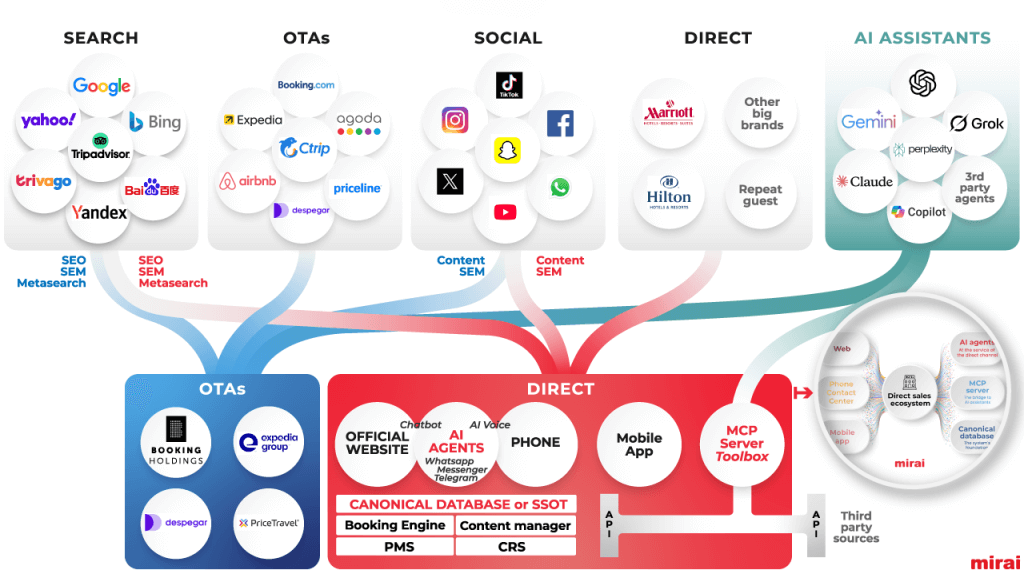
The debate between “best-of-breed” and “all-in-one” solutions is not new; in fact, the war between these competing ideologies has waged on for many years, especially within the world of hospitality.
NB: This is an article from Infor
Subscribe to our weekly newsletter and stay up to date
On one hand, it’s rather easy to make a case for an all-in-one solution – if you can get everything you need, exactly as you need it, in one place, why would you divide and conquer? On the other hand, countless real-life scenarios help to illustrate the limitations of solutions that claim to have it all.
Let’s consider, for example, a modern fitness tracker. Some consumers might opt for the Apple Watch, with the justification that the Apple Watch has a little bit of everything – all the functions of a smartwatch, with the added benefit of health tracking capabilities. However, suppose you push further into the crowd of fitness fanatics. In that case, you might notice that many of those individuals opt for a tracker that is more specific in its capabilities, such as a FitBit, an Oura Ring, a Whoop band, or a Garmin watch.
These consumers aren’t interested in the sweeping functionality of a smartwatch; rather, they want a tracker that is exceptionally good at the specific thing they are using it for (sleep and recovery tracking, accurate caloric expenditure, training metrics, etc.). Similarly, if you were planning an elaborate dinner for your friends and family, and you wanted to make a recipe that requires specific, high-quality ingredients, you might not choose to do all your shopping at the closest grocery store. Sure, it might be more convenient to buy everything in one place, but if your recipe requires specific ingredients, you may find yourself shopping around at a variety of markets to find exactly what you need.
Finally, if you’re planning a wedding, are you looking for one vendor to provide all the services you need for that day? Most likely, you’re relying on a variety of vendors who are experts in their respective craft; from the florist to the wedding planner, the baker to the photographer, and the DJ, couples typically outsource the key elements of their big day to individual providers.
Of course, this isn’t to say there is no place for ‘all-in-one’ services and technology in the modern world; the concept of getting everything you need from a singular vendor within a singular platform is undeniably enticing. Convenience and ease of use carry weight, especially as it pertains to a solution or process leveraged by hotels in a hyper-competitive landscape. However, it’s important not to conflate convenience with effectiveness, and it’s also important to acknowledge the leaps and bounds our industry has made from the historical limitations of legacy, all-in-one platforms. Technology has evolved to meet modern demands for interoperability and, as such, the path away from a monolithic framework no longer leads to a franken-stack of disconnected platforms.
Today, many best-in-class hospitality solutions are built upon an open infrastructure that was designed to integrate seamlessly into a hotel’s existing technology ecosystem. The result? Hospitality brands can build their dream stack of platforms, with a level of flexibility and scalability that was never before possible.
Are hotels all-in on all-in-one platforms?
The adoption of new technology is no small undertaking for any hotel. After all, the bread and butter of the hospitality business is the provision of a memorable stay and superior guest service – technology plays a key role in this endeavor, but the in-person, day-to-day demands of service will always exist at the forefront of the guest experience. As such, if you ask a hospitality brand what the barrier is to adopting a new platform (even when that platform promises to enhance the service they provide guests) the answer often centers around integration concerns, service disruptions, and cost. The platform ecosystems that serve as the technological backbone of hotels are often robust and complex – from the PMS to the RMS, sales and catering platform, and so much more. Oftentimes, when an upgrade is needed, hoteliers aren’t particularly interested in overhauling their entire ecosystem. Rather, they want to strategically select the aspects of that ecosystem that are primed for an update – much like performing a renovation, rather than tearing everything down to start from scratch.
In the past, the ‘plug-and-play’ approach offered by technology stacks could become cumbersome, simply because not all platforms were designed to play nicely with others. If anything, this has always been one of the primary selling points of an all-in-one platform; if a hospitality brand adopts a platform suite through a singular vendor, it could avoid the headaches associated with complex integration processes (and the associated costs). However, the introduction of interoperability standards ensures that modern hospitality solutions are built with easy integration in mind; the responsibility is no longer placed on the customer, and the process is cost-effective and quick. This allows hotels to innovate strategically, at a pace that makes sense for their business, and that allows staff to get comfortable with any new application or platforms and, as a result, use that technology to its full potential.
Hoteliers must also consider the way software was originally designed, as that ultimately dictates the way it will perform for their property. Although all-in-one platforms promise to offer ease of integration and a complete suite of features needed to run a successful hotel, these platforms weren’t necessarily designed that way from the onset. Oftentimes, these suites are patched together over time, rather than built from the ground up with a holistic view of every feature hotels need.
Unlocking the power of specificity
An all-in-one system might have all the bells and whistles, so to speak, but those bells and whistles might include features and applications that a hotel simply doesn’t need (and doesn’t want to pay for). As the saying goes – “Jack of all trades, master of none.” A hotel may not need to replace its PMS, RMS, and CRM all at once, but it may need to replace one of those platforms with a best-of-breed solution that can easily integrate with the rest of its applications.
The ability to pick and choose platforms and applications to add to an existing stack allows hotels to truly customize their ecosystem according to the ever-evolving needs of their business and the expectations of guests. Moreover, from a cost perspective, a large platform suite may simply be too costly, overwrought with features that a hotel doesn’t need while lacking the malleability necessary for true customization. In this way, sometimes a “one-size-fits-all” solution doesn’t fit nearly as well as the individual, best-of-breed solution that you vet, select, and integrate when an upgrade is needed. After all, why pay for something you won’t use?
In the end, the decision between best-of-breed and all-in-one solutions hinges on the unique needs and goals of each hotel. However, with technology – and the demands of the modern guest – advancing rapidly, hotels can no longer afford to rely on solutions that do most things well but don’t allow for the precision and flexibility needed in a competitive landscape. Best-of-breed solutions empower hospitality brands to strategically innovate and offer exceptional guest experiences — while maintaining complete control over their tech stack. As the industry moves toward open systems and increased interoperability, hoteliers can finally unlock the perfect balance between convenience and specialization, building a future-ready foundation that blends that scales with their business and guest expectations.




